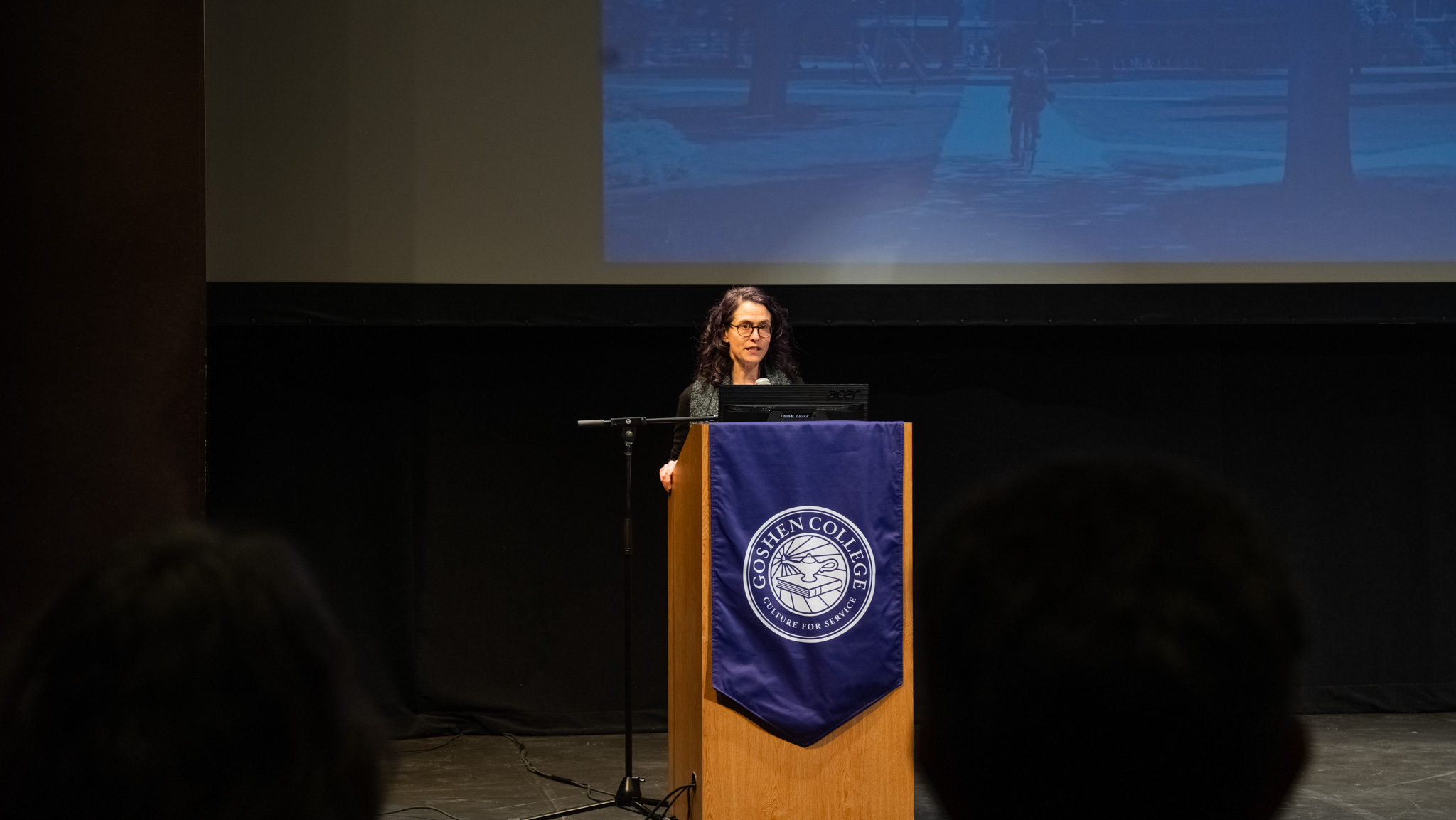Carson Kreitzer, an award-winning playwright, hosted Goshen College’s Umble Master Class in Speech and Theater on Tuesday evening, drawing a crowd of students, staff and community members alike. Kreitzer talked about the craft of playwriting and the complexities of historical storytelling.
Kreitzer earned a bachelor’s in theater and literature from Yale University and a master of fine arts from the Michener Center for Writers at the University of Texas at Austin. A playwright for over 20 years, her plays have garnered recognition and been produced internationally. One of Kreitzer’s newest works, “Lempicka,” is a musical she co-wrote and lyricized alongside composer Matt Gould. The production was nominated for three Tony Awards shortly after its Broadway run from April to May 2024.Amy Budd, associate professor of theater, described the decision to invite Kreitzer, saying: “There are so many students on campus that have really latched onto the idea of becoming self-driven artist-activists, and I thought that what [Kreitzer] had to share with us would be especially salient to this group of people.”
Budd explained that she first came across her work when it was entered into a playwright competition and was floored by the writing. “Carson writes in delightfully poetic, playful language around difficult and often tragic circumstances of our modern age. She’s driven to her topics through finding situations that she absolutely has to unpack, things that she wants to discover,” Budd said.
Kreitzer’s main focus was how art and activism interact — reflecting on personal experiences with art as a way to explore complex issues like gender, justice and climate change — much of her writing deals with these important topics in one way or another. In her lecture, Kreitzer explained that her work is often based on true stories of women she had researched over a long period of time.
“I am interested in women who are really serious outsiders and often become a problem in trying to open the doors of possibility,” Kreitzer said. “The women I write about often go a certain distance and break because it’s very hard to be doing this work of pushing the culture forward and inventing these possibilities.”
A big question that Kreitzer explored in her presentation was the purpose of art as it interacts with her purpose. “I believe that story is the way we connect to one another,” she said. “Story is especially the way we connect to people who are not immediately like us, and story is the way that we can bridge those divides and become curious about other people, rather than frightened.”
Throughout the night, Kreitzer shared quotes and works that she had come across over her career, with one particular writer she stated meant a great deal to her, Rebecca Solnit. Kreitzer quotes: “Hope is not a lottery ticket you can sit on the sofa and clutch, feeling lucky. It is an axe you break down doors with in an emergency. Hope should shove you out the door, because it will take everything you have to steer the future away from endless war, from the annihilation of the earth’s treasures and the grinding down of the poor and marginal … To hope is to give yourself to the future — and that commitment to the future is what makes the present inhabitable.”
Kreitzer later spoke of writing a series of climate crisis plays after several impactful visits to the Arctic. She said it was “the most indescribably beautiful place I have ever been.” Kreitzer explained that while she was there, she had seen large amounts of trash in the beautiful wilderness of it all. She recalled finding a laser printer cartridge while on a beach there and felt like someone was telling her it was her problem. “Even though you didn’t throw this one away, you did this too.” Since then, Kreitzer has been an avid trash collector, regularly picking up litter along waterways when she can.
When asked about finding hope in the shores of the Arctic, Kreitzer explained how shifting from having a show on Broadway after working on it for 14 years to being in the Arctic allowed her to find it. “When you are out there, it is so clear that time is long and the earth is huge, beautiful, and varied like you cannot believe, and we are tiny, and Broadway is even tinier than that.”
Teo Kingsley, a sophomore theater major, attended the master class. “I really enjoyed it, I’ve always been interested in activist-theater, so being able to hear about it was great,” he said. “Something that really stuck with me was [the mention of Solnit] how hope isn’t something you have to cling to, it’s something active, something you work on and push forward.”
Budd also spoke of her hopes that students and community members will take from this event. “I hope it affirms and motivates us to act according to our values and continue making art in a way that creates an impact on our community and uplifts marginalized voices,” Budd said, “It could be really easy to think we can’t make art right now and we have to sacrifice all our joy at a time where there’s a great deal of strife in the world … I want everyone to know how important and vital art-making is to being human.”


